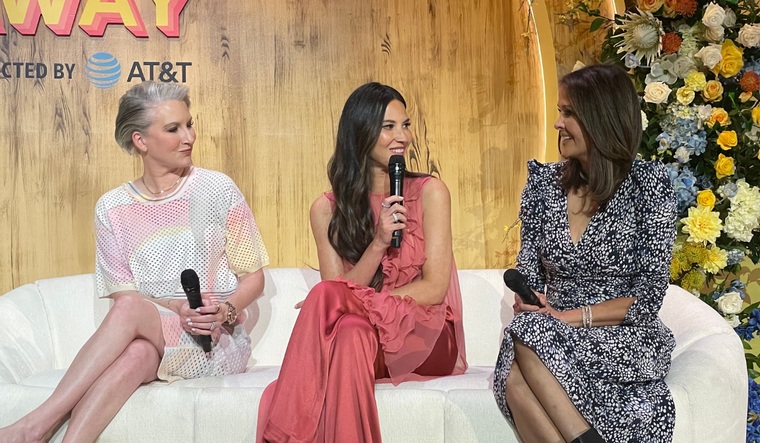Seventeen-Year-Old Zach Gottlieb Is on a Mission to Help Young People's Mental Health. Here's What Gen Z Wants Us All to Know...
Zach Gottlieb is a typical 17-year-old high school junior in a lot of ways. He likes watching TV and hanging out with his friends. He’s admittedly on his phone a lot.
Yet unlike many of his peers on social media sites like Instagram and TikTok, Gottlieb is on a mission to use those platforms to help other teens talk about what they’re feeling—and to share advice that might help them weather the tough stuff life throws their way.
That’s why he launched “Talk With Zach,” a social media platform that aims to normalize talking about mental health in a way in which teens can relate. “I wanted to create a space where teens could talk about the things that affect our lives, from anxiety and breakups to social media pressure and gender identity,” Gottlieb told The Sunday Paper. “There’s so much mindlessness on social media. I wanted to use it in an active way.”
We sat down with Gottlieb to talk about his mission, some of the biggest takeaways he’s learned from shining a spotlight on teen mental health, and what his generation wants the rest of us to know about what they’re going through right now—and how we can best help them.

A Conversation with Zach Gottlieb
You created “Talk With Zach” to help teens share their feelings. What have been some of the things you’ve heard over and over again from your peers when it comes to the state of their mental health?
The main way I engage with my audience is through interviews. I talk to other teens, experts, and celebrities. One of the issues that comes up a lot is relationships—friendships, romantic relationships, even relationships teens have with their parents. It’s a universal topic.
What’s really interesting is that when I started Talk With Zach, I thought it would be local; in Los Angeles, where I live, and in the U.S.. I’ve been amazed how I now have a global impact, and in every continent there are people speaking up about relationships.
What do you think most teens today want their parents and other adults to know about how your generation is doing—and the best ways to help. What’s most needed when it comes to bridging the generational divide?
I feel like the No. 1 thing I’ve heard is that teens want their parents to know that life is so different than when they were in high school and college. It’s important to keep that in mind when you’re putting pressure on us, or talking about the world with us.
Another thing parents need to be mindful of: When you want to have a conversation or talk about something serious, like drug use or romantic relationships, don’t press on us too much. Rather than getting us to open up, it turns us away—and then we hide whatever it is that’s up for us, or we think we’ll get in trouble if we want to share.
Adults need to create a safe space and let your kid come to you. And when they feel ready, it’ll be a great discussion. Try to have an actual conversation and move forward together.
What does Gen-Z want older generations to know about the mental health crisis among teens right now?
There’s definitely a crisis going on. But one thing, it's important to point out that we were dealing with this stuff before, but just not talking about it. Yes, we’re in the midst of a mental health crisis. But I think it feels a lot bigger now because what we’re dealing with is getting illuminated now in bigger ways.
Anxiety has always been there. Pressure from parents has always existed. Yes, the pandemic has exacerbated things. College pressure has gotten worse. But these things have been ongoing.
Do you think it’s harder to be a kid these days—or just different?
Maybe a little of both. For previous generations, the lack of social media led to a lot more intimate relationships and a lot less pressure. For us, having to put ourselves out there on social media all the time—comparison has skyrocketed! You can see your friends all the time now, and everyone edits their pictures, only posts the best angles and the best shots—and that’s tough to recognize in the moment.
The upside for Gen-Z is that social media allows us to find our people and have relationships that just weren’t possible before. There’s a lot more connection now, and if used correctly, it has so much potential. But we have to be mindful about what we do with what we have.
With such a spotlight on our collective mental health crisis, it’s easy to focus on the negative and forget the positive. What are some of the ways teens are thriving right now?
One thing I’ve noticed is that more teens are opening up about what they’re feeling. We’re understanding the importance of being vulnerable and having these conversations. Even people I’ve never seen open up before are starting to share what’s happening for them.
I also think Gen-Z wants to have a big impact on the world. We have the means to do it. If we use our voices, we can change the way future generations deal with everything. There are so many movements we are a part of, whether it’s gender equality, racial equality, climate change—the list goes on. We’re empowering others along the way. We have so much potential.
You’ve said that with “Talk With Zach” you wanted to create a space where you could model that guys can talk about what they’re feeling. Do you think it’s getting easier for young men to open up about what’s on their minds?
Yes, 100 percent I think it’s easier now for guys to be vulnerable. I’ve noticed this in some of my friends, and as more and more notable figures start modeling this, that’s where we see change.
When I first started Talk With Zach, some of my friends were like, “Why’s he doing this?” Now, those same people understand the importance of speaking up and sharing what’s on your mind. The only way we’ll see change is if we see more people modeling it for everyone.
You interview celebrities, experts, and other teens for your IG lives. What have been some of your most popular topics? And what have been some of your biggest takeaways?
There have been so many things I’ve learned. I go into these interviews thinking they’ll empower my audience, and I always come out feeling I’ve learned so much.
One of my favorites was a recent interview with Paulina Porizkova about comparison. What stood out to me is how she framed body positivity and uses comparison as a power instead of something that would work against her. In this world of comparison, she said, “Compare you to you—that’s the only person you should compare yourself to.” I thought that was such a powerful message for someone my age—and really, for anyone.
Although I’m focused on Gen-Z, the topics I discuss are really universal. They apply to anyone. Things like relationships, anxiety, how to find happiness and fulfillment in life—you’ll deal with these topics for the rest of your life, no matter your age. Yes, I’m focused on my demographic. But the stuff we talk about—and the advice on how to face it all—applies to all of us.

Zach Gottlieb is the 17-year-old founder of Talk With Zach, a Gen Z movement and community that hosts important conversations to change the culture, inspire activism, and make the world a better place. Talk with Zach has been featured in TIME, TODAY, Katie Couric Media, The Huffington Post, and Challenge Success, among others. His motto: “We can’t change what we don’t talk about.” Learn more about @talkwithzach on Instagram.
Question from the Editor: Is there a young person in your life with whom you'd like to bridge the generational divide and have more open, candid conversations? How will you show up with honesty and authenticity in those chats?
Please note that we may receive affiliate commissions from the sales of linked products.




